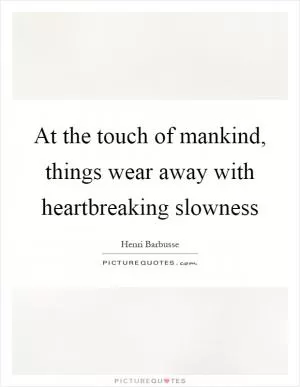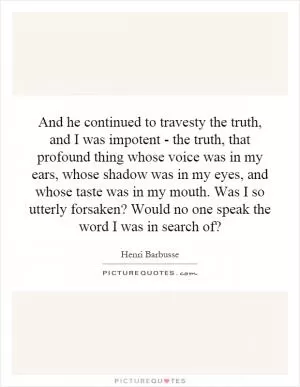I stood still, a prey to a thousand thoughts, stifled in the robe of the evening

I stood still, a prey to a thousand thoughts, stifled in the robe of the evening
Henri Barbusse, a French writer and journalist, was known for his powerful and thought-provoking works that often delved into the complexities of human nature and the horrors of war. In his novel "Under Fire" (also known as "Le Feu"), Barbusse vividly captures the experiences of soldiers during World War I, offering a raw and unflinching portrayal of the brutal realities of combat.The quote "I stood still, a prey to a thousand thoughts, stifled in the robe of the evening" encapsulates the sense of overwhelming introspection and emotional turmoil that permeates Barbusse's writing. In the midst of chaos and destruction, his characters are often depicted as being consumed by their own thoughts and emotions, struggling to make sense of the senseless violence that surrounds them.
The image of standing still, paralyzed by a flood of thoughts, evokes a sense of helplessness and vulnerability that is all too familiar to those who have experienced the horrors of war. In the quiet moments between battles, when the dust settles and the smoke clears, soldiers are left to grapple with the weight of their own thoughts and memories, haunted by the specter of death and destruction.
The mention of being "stifled in the robe of the evening" further emphasizes the suffocating nature of war and its psychological toll on those who are forced to endure it. The evening, traditionally a time of peace and reflection, becomes a shroud of darkness and despair, enveloping the protagonist in a cloak of uncertainty and fear.
Barbusse's writing is characterized by its stark realism and unflinching portrayal of the human condition. Through his vivid descriptions and evocative imagery, he invites readers to confront the harsh realities of war and the profound impact it has on those who are caught in its grip.












 Friendship Quotes
Friendship Quotes Love Quotes
Love Quotes Life Quotes
Life Quotes Funny Quotes
Funny Quotes Motivational Quotes
Motivational Quotes Inspirational Quotes
Inspirational Quotes